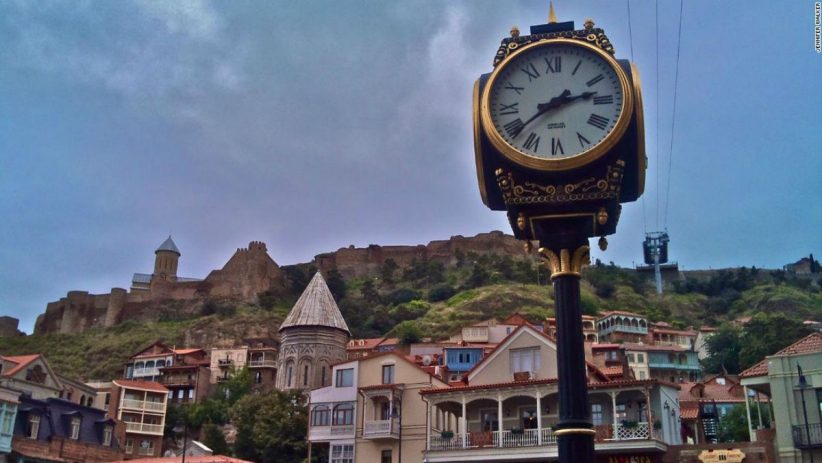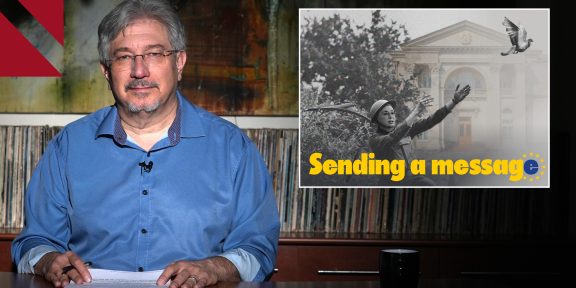By Liz Fuller
The polarisation of Georgan society in the run-up to the run-off presidential vote has reached an unprecedented level, according to commentator Vladimir Bozhadze, surpassing even that on the eve of the 2012 parliamentary elections in which the Georgian Dream coalition headed by billionnaire Bidzina Ivanishvili put an end to the nine-year rule of then Georgian President Mikheil Saakashvili’s United National Movement (ENM).
The presidential run-off vote pits nominally independent law-maker Salome Zourabichvili, who is backed by Georgian Dream – Democratic Georgia, against Grigol Vashadze, who was nominated by the Strength is in Unity bloc comprising the ENM and nine small extra-parliamentary parties. But even though Georgia is a parliamentary republic in which the role and powers of the president are largely symbolic, the presidential election has come to be perceived as a battle between the ENM and GD, the country’s two leading political forces, each of which has long demonised the other. That mutual loathing and enmity was reflected in the aggressiverhetoric they resorted to during the election campaign, and which domestic and international observers alike characterised as disturbing.
During the initial vote on 28 October, Zourabichvili placed first with 38.64 percent of the vote, less than 1 percent ahead of Vashadze who garnered 37.74 percent. That outcome was met with exultation among ENM supporters, and with shock and consternation by Georgian Dream.
Over the past three weeks, the ENM has stepped up what political commentator Khatuna Lagazidze calls its “informational and psychological war” against Zourabichvili personally and GD in general, which it accuses of attacks on its activists in the regions and of planning to falsify the outcome of the run-off to secure a win for Zourabichvili. .
On 12 November, Zourabichvili announced that over the previous three days she and her two children received death threats by SMS and voice mail Zourabichili said the persons responsible are former servicemen whose identity is clear from their posts on social media, and that they have connections with the ENM.
Strength is in Unity responded on 13 November to Zourabichvili’s revelation with a statement saying “the United Opposition has no involvement in, nor knowledge of, the alleged death threats against presidential candidate Salome Zurabishvili and members of her family.” It demanded a timely investigation of Zourabichvili’s allegations, which it said could be construed as “unfounded attempts at victimisation” of its own presidential candidate.
GD initially appeared unwilling to acknowledge how and to what extent it has alienated voters, and how best to win back their sympathy. True, Ivanishvili and other leading party members belatedly admitted that the party failed to deliver on the pledges it made during the 2012 and 2016 parliamentary election campaigns to improve the economic situation and living standards and to reduce unemployment, which despite the exodus of hundreds of thousands of people to Russia and Europe in search of work is estimated by local experts at around 30 percent. (It is 12 percent according to official statistics.)
But the announcement by Prime Minister Mamuka Bakhtadze of a planned increase in social spending was slammed by Transparency International – Georgia (TI) and the International Society for Fair Elections and Democracy (ISFED) as counter to international guidelines barring the use of budget funds to sway voters.
For the rest, GD has redoubled its histrionic warnings that a Vashadze win would bring a return to the human rights abuses and political killings that were a hallmark of the ENM’s nine years in power. Vashadze has pledged to pardon Saakashvili, who has been sentenced by a Tbilisi court to three separate jail terms and currently risks immediate arrest if he tries to enter the country.
Citing out of context declarations by Vashadze himself in a 7 November interview with Deutsche Welle and by one of his spin-doctors, Tbilisi mayor Kakha Kaladze, who is GD general secretary, and parliament speaker Irakli Kobakhide, have both accused the ENM of planning a revolution.
On 12 November, Kobakhidze, who has played a prominent role in managing Zourabichvili’s election campaign, branded the ENM “a criminal, dirty political force with no political future in Georgia.”
Meanwhile Ivanishvili, who personally took the decision to back Zourabichvili’s presidential candidacy despite her unpopularity with voters and with some members of his own party, inadvertently played into the hands of those who accuse him of being totally out of touch with the public mood by closing Svetitskhoveli cathedral to worshippers on 11 November for the wedding of his son Bera. Vashadze accused Ivanishvili of acting like a feudal lord; he claimed the security measures on which Ivanishvili insisted included evacuating the entire town of Mtskheta.
Two subsequent moves by GD appear similarly counter-intuitive. First, even though many Georgians who voted for GD in 2012 and 2016 restrained from casting their ballots for Zourabichvili this time around in order to convey their disenchantment with the party and with Ivanishvili personally, new Zourabichvili campaign posters have appeared featuring images and detailed biographies of Ivanishvili and parliament speaker Kobakhidze, but no picture of Zourabichvili herself.
The choice of Kobakhidze is odd in light of his intemperate attacks on NGOs and civil society in early October. He was quoted as telling the pro-ENM broadcaster Rustavi-2 that prominent civil society organisations which had criticised a perceived “clear crisis in governance” are out to promote their own political agenda and cannot claim to represent society as a whole.
Then on 14 November, Georgia’s Central Election Commission (CEC) finally scheduled the second round run-off for 28 November, which is a Wednesday. Earlier on 14 November, TI, ISFED, and the Georgian Young Lawyers Association had released a joint appeal to the CEC to schedule the run-off for 1 December (a Saturday) so as not to make it difficult for Georgians living and working abroad to make their way to polling stations on a work day. TI and ISFED have lodged a formal plea with the Tbilisi City Court to annul the CEC’s decision, as has Strength is in Unity.
















